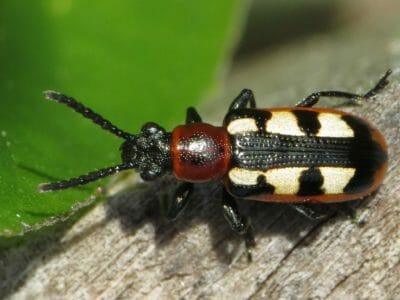While there are many ways to deal with pests, most have disadvantages for the off-the-grid gardener. The bright yellow sticky traps used to capture aphids, cucumber beetles, thrips and other pests are unsightly and unpleasant to dispose of and are not sustainable. Copper strips can be effective in repelling slugs and snails, but the installation of it can be labor intensive, and the copper must completely surround your plants and be exposed at all times (no mulch or loose soil can be allowed to cover them).
You can also handpick or vacuum insects. This is not 100 percent effective and can be impractical for a larger homestead garden.
Indiscriminate use of highly toxic pesticides may kill your pests, but it also destroys the delicate ecological balance of a successful organic garden. Worst of all, you could grow genetically modified crops, which have built-in pest deterrents but come with the all-too-high cost of increasing pests’ resistance to natural deterrents, sterilization of plants, and potential unknown health impacts on humans.
There is another way. For those of us living off the grid, and serious about self-sustainability and growing food to provide a major portion of our diet, a great solution is growing companion plants to repel insects. While there is no one magic plant that repels all pests, certain vegetables, herbs, and flowers will repel the pests that destroy other plants.
Here are examples, some of which are provided by Louise Riotte [2], a highly respected and successful organic gardener, decades before the term “organic gardening” came into existence.
Stop Garden Beetles With Radishes
These are my favorite pest-repelling plants. After they grow to maturity, you can eat the radish pods all during the summer.
To protect melons, squash and cucumbers from cucumber beetles, plant a few radishes [3] around the base of each plant.
If spider mites are a problem for your tomatoes, sow a few radish seeds among your tomato plants.
Radishes in your corn plot may help repel corn borers. However, it may not be enough, and you may have to resort to Bacillus thuringiensis (Bt) or other applications of organic pest control.
Stop Beetles With Tomatoes
While tomatoes are a favorite crop for both fresh eating and canning or freezing, they provide protection for a variety of plants against pests. The leaves of tomatoes contain solanine, a chemical unattractive to many insects.
Tomatoes [4] protect asparagus from asparagus beetles, gooseberries against most insects, and inhibit the flea beetle, which attack beans, eggplant, mustard plants, and many other crops [5].
One word of caution with tomatoes: Their roots provide excretions that can inhibit the growth of other plants. The Cabbage family (cabbage, broccoli, cauliflower, Brussel sprouts, kale, turnips and many others). Potatoes and fennel do not grow well near tomatoes.
Chemical Free Garden Beetle Solution [6]
Stop Garden Beetles With Nasturtium
What’s this? Well, besides being hard to spell and harder to pronounce, this easy-to-grow, beautiful flower helps protect your garden from insects. However, it works differently than the other plants examined here. While radishes, tomatoes and the herbs and flowers discussed below repel garden beetles, nasturtium [7] attracts them. In fact, aphids, flea beetles, and slugs love nasturtium. The strategy for nasturtium is to use it as a trap crop — in other words, a crop that diverts pests from your vegetable plants and sacrifices itself by letting the pests eat it rather than your plants. So instead of interplanting nasturtium, plant in near your other vegetables and then check it weekly to remove any heavily infested leaves.
Use nasturtium with care, until you find the right balance of too little or too much. Do you want to divert pests from your garden crops? Rather than simply have the nasturtium attract pests that would not otherwise visit your garden.
Other Herbs And Flowers
Herbs and flowers, in addition to repelling many pests in plants, bring beauty and diversity to a homestead garden. Here’s how they help common garden vegetables:
- Cabbage family – Although mint is invasive, it inhibits [8] aphids, ants, flea beetles, white cabbage moths and even rabbits and rodents. Rosemary and sage discourage cabbage moths, while thyme deters cabbage worms. Scented marigolds (not Mexican marigolds) and garlic inhibit pests in general around the Cabbage family.
- Carrots and celery – Parsley, chives and sage ward off carrot flies.
- Corn – Geraniums inhibit Japanese beetles and cabbage worms.
- Beans – Summer savory repels bean beetles.
- Lettuce – Many herbs are beneficial for lettuce against pests. Mint acts against aphids and cabbage worms, sage inhibits slugs and cabbage moths, and dill and chervil repel aphids.
- Potatoes – If you have healthy potato plants and the next day you come back to nothing but skeletonized leaves, potato beetles have had a feast. It’s time to consider the following companion crops to combat them next year: beans, horseradish, catnip, and coriander.
- Tomatoes – Hornworms love to munch on tomato leaves. I’ve never had enough of them to do serious damage, and with an ultraviolet flashlight [9], they are easy to find on the plants. However, if you’ve experienced a problem in the past, try growing a few marigolds or petunias to inhibit hornworms.
In this modern world, we sometimes get caught up in technology and modern conveniences. While garden beetles can be controlled with synthetic pesticides or other methods initially discussed, sometimes Mother Nature’s way is the best. Interplanting crops with plants that deter the primary pest threat to the crop is a simple way of reducing pests in the garden.

